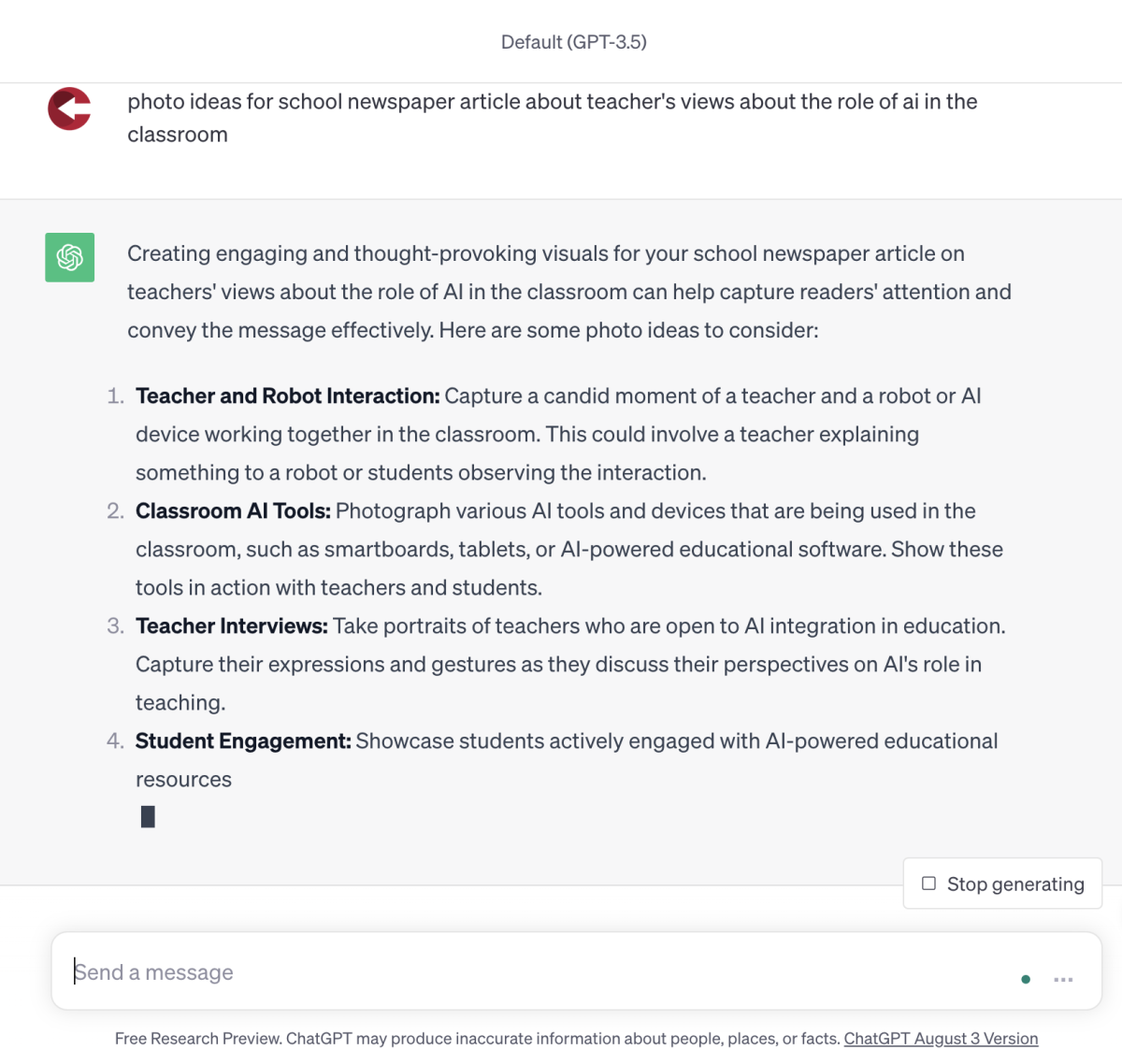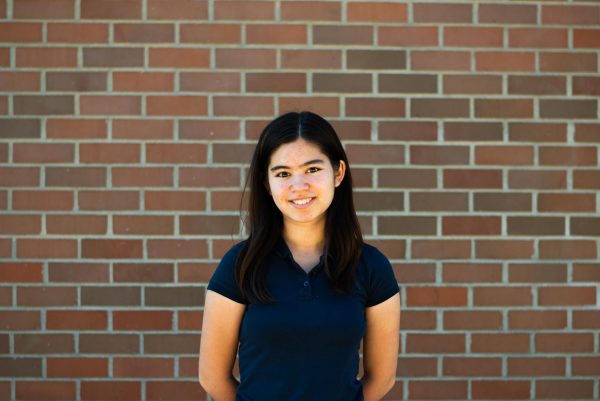Math teacher Rachel Tucker knew that due to the amount of writing needed for the year-long AT statistics project, there was a possibility that some students would use ChatGPT, so she told them they would be allowed to use it as long as they cited it as a source.
“AI is going to be a part of our world going forward,” Tucker said. “And so teaching thoughtful, productive use is important. And filing it under honor code situations is also important. If schools try to ban it altogether, [that won’t] be productive because students are going to use it anyway, but without guidance and coaching on what’s useful, productive, or will give good results.”
To prepare students for this new academic landscape, history teacher and freshman Class Dean Christy Story held a workshop for ninth graders to “have a conversation about tools that exist and that they’re using, but to have that conversation grounded in understanding the limitations.”
As for how AI should be used, “I see us as a community of honor,” Story said, “but I also see us as a community that embraces emerging technology. And so how can we have those two things be true, and meet our culture?”
According to Story, appropriate times to use AI, for which she said a teacher’s expectations should be clear in the course description, should be “in collaboration with your teacher,” and that “you should always be citing it, because it’s a source [just] like any other source. If you’re not clear with your teacher, [they don’t] know whether it’s masking a skill deficit or not.”
Story said that AI would be helpful for three main uses: drafting ideas, research, and reviewing or decoding text.
Instructional and programming librarian Tasha Bergson-Michelson said that for last year’s ninth grade history final, students were given the option to “use AI to build stepping stone resources to help them identify search terms,” and that former science teacher Tiffany Crist-Studley assigned a project in her eighth grade science class to fact check essays written by ChatGPT.
“I really don’t believe that fighting change tends to be very successful,” Bergson-Michelson said. “Librarians fought against the web when it was introduced. We ended up having so much less research education in schools because we weren’t keeping up as a field.”
Tucker proposed that generative AI could increase the accessibility of education, even if it wasn’t world-class quality, saying that it could be beneficial “if every single student could have a mediocre tutor through AI.”
“I want students to learn how to use [AI] thoughtfully because I think it is going to be a tool in the future,” said Tucker. “But I also want to make sure it’s not doing the thinking for the students.”
Tucker likened the use of AI to that of a calculator, which are typically not allowed in elementary schools even though later in life, devices that can do any calculation are readily available. Without a strong understanding of basics such as addition or multiplication, it’s difficult to understand more complex ideas such as exponents, derivatives, and calculus.
Similarly, “if we’re letting AI do the basics, then students don’t develop enough to get to the high level thinking that AI can’t do,” said Tucker, emphasizing the necessity of “a similar process of teaching the basics and then, as students grow, teaching them how [and when] to use AI.”
“It really is a blend of [what] we’ve been seeing happen in a whole new world based on just how much more it can do,” said Tucker. “The speed of change with technology is hard for both teachers and students to navigate.”
Story stressed the increasing importance of a strong student-teacher relationship in the age of AI. Because artificial intelligence tends to “hallucinate” or make up information and students are less prepared to catch these mistakes. “That relationship between teacher and student is only becoming more important just at the moment that students are thinking, ‘I don’t need a teacher because I have AI,’” Story said.
According to Tucker, “it’s easy just to trust [information] that you see written or said really confidently. This is a great way to teach critical thinking and cynicism about how you interpret or how much you trust things in the world which, given the introduction of AI, is important.”
Similarly, Bergson-Michelson stressed the importance of fact-checking in the wake of AI hallucinations.
She said she has “watched people forfeit critical thinking for the ease of using Google search.”. Stating that “information skills are at the core of the challenges we have as a nation in the world right now” and that “research skills are the basis of an informed democracy,” she values her students’ capacities to “express themselves [and] think critically about the information they engage with” and worries that these skills will be lost to generative AI.”
English teacher Matt Callahan hasn’t seen “a way in which AI would synthesize ideas or help in a way that’s not short circuiting a goal of [students moving] towards what [he calls] high level literary analysis.”
He said his goal is for students to develop their own “unique critical voice.” This cannot be found in AI-generated essays, which he said he doesn’t want students to even consider as an option due to their investment in the questions explored in class.
If the game was just to win, to get an A or a 4 under time pressure, Callahan said that it would make sense that students would use AI; yet it wouldn’t be used “if the goal is to create a shared intellectual community where we’re really engaging with these deep questions, preparing for college-level writing and grappling with big ideas through writing.”
Callahan and Bergson-Michelson both stressed the importance of setting clear goals in education to be cognizant of when surrounded by technology able to do much of the work.
“Education changes very slowly,” Tucker said. “I think schools will continue to look very similar. I hope that it makes teachers thoughtful about what assignments they give to make sure that their assignments are teaching and assessing what they want them to.”
Callahan said he had pessimistic views about technology in general. “Technology further alienates us from the world,” he said. “I worry that AI will have this sort of degrading effect on reading and writing. I don’t think it will be permanent. I think just like everything, it’s like a pendulum swing.”
He said he predicts we will be flooded with AI-generated text lacking personality and meaning, but then there would be a response to this, a change in the way we write and read that would compensate for AI generation.
Bergson-Michelson said she saw parallels between the rise of AI and other advances throughout history. She said that things tended to accelerate, such as with written language, the Internet and Wikipedia, and now, AI. However, like Callahan, she said that “this constant search of peak efficacy is like losing something integral to all these processes that are going on.”
“When it comes to technological innovation, it’s good to think about it with a head of cynicism and be wary of the outcome,” she said, but also said she is hopeful about a positive outcome.
“The world is an infinitely interesting place,” said Bergson-Michelson, “and we will probably find infinitely interesting ways to use generative AI and just hope that it doesn’t shortcut our ability to build a functional society that we want to live in.”



